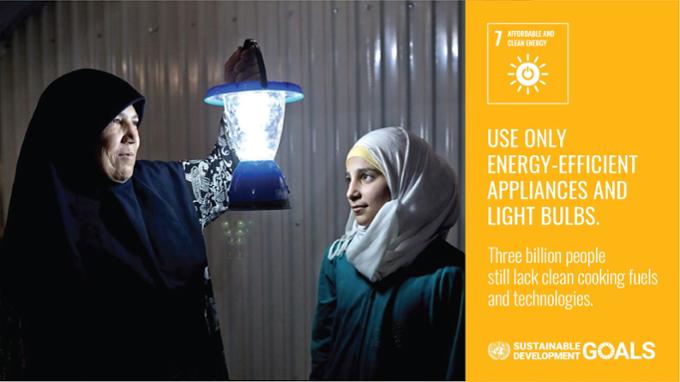Affordable and Clean Energy
Our everyday life depends on reliable and affordable energy. Yet energy consumption is the dominant contributor to climate change, accounting for around 60 percent of total global greenhouse gas emissions.
In 2022, the University used 85,000GJ of energy over 253,682m² of floor space. We undergo regular energy reviews to identify areas of energy waste, and seek to make our buildings more energy efficient.
Did you know?
The University of Regina's Research and Innovation Centre was designed to achieve remarkable energy-savings, and features southern Saskatchewan's first modern institutional green roof!
Our Research & Resources
Clean Energy Transition Hub

Energy Dashboard
Past News and Events
- University of Regina launches Canadian Energy Transition Hub (2021)
- Reducing GHG Emissions in the Power Sector (2020)
- New report urges a focus on equity in Regina's transition to sustainability (2020)
- Nuclear power possibilities for Saskatchewan (2020)
- Evaluation of CO2 Sequestration Opportunities in Lloydminster Post-chops Heavy Oil Reservoirs and Underlying Aquifers
- Screening of Adsorbents for Lithium Extraction from Saskatchewan Brine Deposits
- 5 ideas to fight climate change through better land use (2019)
Related Courses
ECON 273 - Environmental Economics
A study of contemporary environmental issues using economics. What are the economic costs and benefits of pollution? How do emission standards, environmental taxes, and tradable permits work in reducing pollution? What are the cost-effective ways to address environmental challenges like climate change?
***Prerequisite: 15 credit hours or ECON 100.***
ECON 274 - Ecological Economics
A study of the economy as a system embedded within earth systems. The course explores questions like: What are the key energy and material flows in the economy? Can economic activity be decoupled from environmental impact? How should we define and achieve sustainability?
***Prerequisite: ECON 100 or 15 credit Hours.***
*Note: Students may receive credit for one of ECON 274 or ECON 296AH.*
ECON 275 - Energy Economics
A study of basic economic concepts underlying energy production and consumption. Topics include: the structure of the energy sector including ownership structures and regulation; conventional and emerging energy resources; environmental impacts, economic development, and geopolitics surrounding energy production and consumption.
***Prerequisite: ECON 100 or 15 credit hours.***
*Note: Students may receive credit for one of ECON 275 or ECON 296AL.*
ECON 372 - Natural Resource Management on the Prairies
Problems in the prairie oil/gas, timber, uranium, potash, power generation and water management sectors; preservation of prairie ecosystems; application of theory to determine how best to deal with these problems.
***Prerequisite: ECON 201***
ECON 373 - Climate Change Policy
This course will explore questions such as, What policy options are available to address climate change? What climate change policies have been introduced in Canada and around the world? How do we evaluate whether climate change policy has succeeded?
***Prerequisite: ECON 201 or ECON 273.***
*Note: Students may receive credit for one of ECON 373, ECON 396AW, or GEOG 396AM.*
ENEL 834 - Smart Grid: Architecture, Design and Analysis
The following topics are covered: Smart grid characteristics, components, distributed intelligence and automated control. Smart grid challenges. Smart meters technologies, architecture and design. Integration of renewable energy, distributed generation and energy storage. Smart grid reliability analysis. Two-way communication, privacy and security. Smart grid data management architecture and data analytics.
ENER 305 - Fundamentals of Energy Processes
This course will introduce the following eight renewable energy sources: 1. Solar energy; 2. Wind energy; 3. Geothermal energy; 4. Hydroelectric energy; 5. Hydrogen energy; 6. Biomass energy (biofuels); 7. Nuclear energy; and 8. Ocean energy (wave and tidal). This course will describe the underlying principles and current techniques to design these energy generation systems. It will provide fundamental concepts and design knowledge involved in the energy generation, transportation and storage processes.
***Prerequisite: ENGG 140, ENGG 141, ENIN 253, and ENER 203.***
ENER 451 - Hydro Energy Systems Design and Application
Understand definitions and concepts of hydro energy. Learn development of hydropower technology and its application. Study components and principles of hydropower with emphasis on hydro-electric pump storage, turbine types and classifications, hydro energy generation processes. Explore design and application of hydroelectric power plant.
***Prerequisite: ENER 305 and ENEL 280.***
ENER 471 - Machine Learning for Energy Systems
This course is designed to build industry-valued knowledge for engineering students looking to work in both renewable and non-renewable energy sectors or continue their education in related fields. It is aiming at fostering students knowledge about fundamental theory and algorithms of machine learning as a new trend in the education and in order to evolve in the world’s new direction of science. Concepts such as data science, big-data analytics, data mining, data filtering, probabilistic and statistical analysis and modelling, supervised and unsupervised learning in widely applicable language such as Python, commonly used AI methods and applications, as well as optimization techniques with the main focus on energy systems engineering will be covered.
***Prerequisite: ENER 305 and CS 110:***
ENEV 463 - Water Resources Systems
Water resources planning and management. Topics include planning for hydroelectric, flood control, water supply and irrigation projects; stochastic processes; synthetic streamflow generation; simulation and optimization of water resource systems.
*** Prerequisite: ENEV 462 ***
ENEV 886DK - Sustainable Energy Storage Systems
Principles of energy storage, system design, techno-economic and environmental analysis, applications of energy storage systems for net zero emissions.
ENIN 880AU - Engineering Risk Management
This course provides the student with knowledge and tools necessary to perform hazards analysis, reliability assessment, consequence analysis, event tree and fault tree analysis, maintenance management, and risk-based decision-making for engineering components.
ENIN 880BL - Energy Technology for Greenhouse Gas Mitigation
This course deals with energy technologies that minimize generation and emissions of greenhouse gases from combustion of both renewable and non-renewable fuels. Examples of technologies are biodiesel production, carbon capture and natural gas purification.
ENIN 880CM - Renewable Energy Technology
Introduction of renewable energy technologies for energy-production. Course topics include basic fossil-fuel-based technology, biomass technology, solar-based technology, hydro technology, geothermal technology, wind and tidal-based technology.
*Note: Students may receive credit for one of ENIN 880CM or ENPC 880AU.*
ENPC 880AV - Advanced Heat Pump Technology for Clean Energy Applications
Course topics include the design and operation of heat-pump technology using various process configurations and different refrigerants. A series of technologies for renewable energy utilization and storage will be integrated into the heat-pump systems. Performance of the integrated heat-pump system will be assessed using real case for clean energy applications.
GES 326 - Environment and Resource Management
A systematic analysis of geographical aspects of theory and methods of natural resource management. Focus is on the geographer's role in resource analysis and policy decisions with examples from agriculture, forestry, wildlife, energy, and parks.
***Prerequisite: 30 credit hours, including GES 100 or GES 120, or permission of the Department Head.***
*Note: Students may receive credit for only one of GES 326 and GEOG 326.*
GES 372 - Climate Change Policy
This course will explore questions such as: What policy options are available to address climate change? What climate change policies have been introduced in Canada and around the world? How do we evaluate whether climate change policy has succeeded?
***Prerequisite: GES 200.***
*Note: Students may receive credit for one of GES 372, ECON 373, ECON 396AW, GEOG 396AM, and GES 396AM.*
GES 431 - Climate Change Impacts, Adaptation and Vulnerability
This course focuses on the impacts of climate change on biophysical and and social systems, and the adjustments to policies and practices that will be required to minimize the negative impacts. It is intended for advanced undergraduates and graduate students with an interest in this emerging and important field of study.
***Prerequisite: GES 120 and GES 121.***
*Note: Students may receive credit for only one of GES 431, GEOG 431, GEOG 831, or GEOG 491AB.*
INDG 222AC - Northern Saskatchewan
This course examines the region known as Northern Saskatchewan: the history of the people who have shaped the region; government policies that have altered the political and social landscape, with emphasis on natural resource development and; the economic and social programs provided to the primarily Aboriginal population.
***Prerequisite: INDG 100, or permission of the Program Coordinator.***
INDG 390AP - Contemporary First Nations Resource Uses
The research course focuses on continuity and innovation within modern First Nations uses of natural resources.
SOC 230 - Environment and Society
This course introduces students to sociological perspectives on the relationship between society and the natural environment. The course examines the environmental impact of the actions of individuals, businesses and governments. Specific topics might include climate change, environmental degradation, sustainability and environmental movements and conflicts.
***Prerequisites: Completion of 12 credit hours or SOC 100 or permission of department head.***
*Note: SOC 100 is required for all majors in Sociology.*
*Note: Students may receive credit for one of SOC 230 or GES 297AB.*
SOC 330 - Sociology of the Environment
This course examines social theories, social concepts, and methodological issues related to the understanding of the environment in classical and modern sociological theory. Specific topics might include the social construction of nature, gender, class, race and the environment, sustainability, and the challenges of interdisciplinarity.
***Prerequisite: Completion of 30 credit hours including completion of one 200-level SOC course, or permission of the Department Head.***
